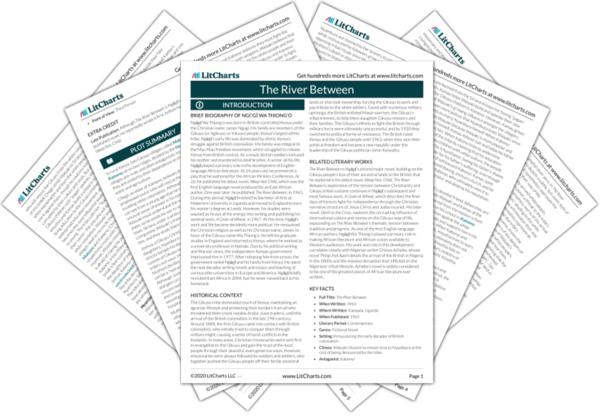Gikuyu Quotes in The River Between
The ridges were isolated. The people there led a life of their own, undisturbed by what happened outside or beyond. Men and women had nothing to fear. The [white people] would never come here. They would be lost in the hills and the ridges and the valleys.
“Arise. Heed the prophecy. Go to the Mission place. Learn all the wisdom and the secrets of the white man. But do not follow his vices. Be true to your people and the ancient rites.”
[Miriamu’s] faith and belief in God were coupled with her fear of Joshua. But that was religion and it was the way things were ordered. However, one could tell by her eyes that this was a religion learned and accepted; inside, the true Gikuyu woman was sleeping.
The knife produced a thin sharp pain as it cut through the flesh. The surgeon had done his work. Blood trickled freely on to the ground, sinking into the soil. Henceforth a religious bond linked Waiyaki to the earth, as if his blood was an offering.
Circumcision had to be rooted out if there was to be any hope of salvation for these people.
Schools grew up like mushrooms. Often a school was nothing more than a shed hurriedly thatched with grass. And there they stood, symbols of people’s thirst for the white man’s secret magic and power. Few wanted to live the white man’s way, but all wanted this thing, this magic.
Circumcision was an important ritual to the tribe. It kept people together, bound the tribe. It was at the core of the social structure, and a something that gave meaning to a man’s life. End the custom and the spiritual basis of the tribe’s cohesion and integration would be no more.
As the spiritual head of the hills, [Joshua] enforced the Church’s morality with new energy. All the tribe’s customs were bad. That was final. There could never be a compromise.
Father, if you had many cattle and sheep
I would ask for a spear and a shield,
But now—
I do not want a spear
I do not want a shield
I want the spear and shield of learning.
For Waiyaki knew that not all the ways of the white man were bad. Even his religion was not essentially bad. Some good, some truth, shone through it. But the religion, the faith, needed washing, cleaning away all the dirt, leaving only the eternal. And that eternal was that the truth had to be reconciled to the traditions of the people.
The land was now silent. The two ridges lay side by side, hidden in the darkness. And Honia river went on flowing between them, down through the valley of life, its beat rising above the sark stillness, reaching into the heart of the people of Makuyu and Kameno.












